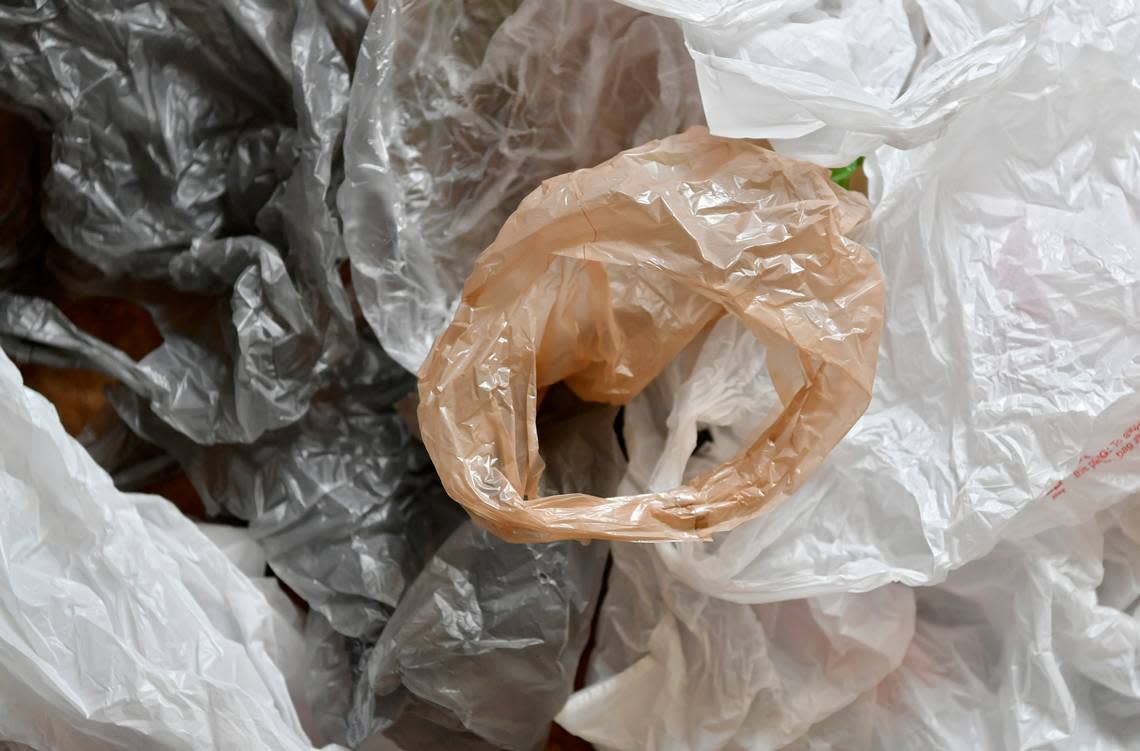After Lawrence bans single-use plastic bags, Kansas lawmakers want to block restrictions

Lawrence last year banned single-use plastic bags, citing environmental concerns, and imposed a fine of up to $500. The new rules take effect on March 1.
But Kansas lawmakers want to ban the ban.
Republican lawmakers are trying again to prohibit local restrictions on single-use plastic bags in state law, after Democratic Gov. Laura Kelly vetoed a similar measure in 2022. A new bill under consideration would prohibit municipalities from regulating the bags, as well as straw and single-use plastic containers.
Rep. Christina Haswood, a Lawrence Democrat, said her constituents were disappointed the Legislature is continuing to try to take away the power of local governments. She called promoting environmentally-friendly rules a community value in Lawrence.
“To see all that work and effort be taken out from the state level and overreaching that respect of power at the same time is really disappointing to my community,” she said.
Twelve states and over 500 cities across the country have enacted bans on plastic bags. Other states – such as Florida, Montana, Idaho, Texas and Minnesota – have preemptively banned any regulation on single-use plastics.
During a hearing on the bill on Tuesday in the Kansas Senate Federal and State Affairs Committee, proponents of the legislation argued bans on single-use plastics would harm businesses by creating confusing and contradictory policies across the state, thereby disrupting supply chain patterns.
Eric Stafford, a lobbyist with the Kansas Chamber of Commerce who requested introduction of the bill, said the proposal was always intended to be preemptive but is now time sensitive due to Lawrence’s ordinance.
A ban would put businesses at a competitive disadvantage, he said.
“At the end of the day, everybody strives to be environmentally conscious,” Stafford said in an interview. “But it’s the government telling people what that means. They need to stay out of it and let the private sector decide how to best operate according to the wants and needs of their consumers.”
Opponents of the legislation say the bill represents a lose-lose situation for businesses, the environment and for local governments. They argued that single-use plastics cause negative public health effects and copious amounts of plastic pollution – especially in areas such as the Kansas River.
Nancy Muma, the chairman of the University of Kansas’s Department of Pharmacology and Toxicology, held up a plastic debit card during the hearing as a visual representation of how much plastic the average person consumes per week through microplastics.
“They are dangerous,” she said.
Opponents contend the Legislature should respect the power of local municipalities under “home rule” outlined in the state’s constitution. Home rule authorizes local governments to implement policies relevant to local issues.
Rabbi Moti Rieber, a lobbyist for the advocacy organization Kansas Interfaith Action, said the only way to pass meaningful, environmentally-friendly legislation is through local ordinances since the Legislature has no committees dedicated to climate legislation.
“Kansans take it upon themselves to work through their municipalities and local governments to address pressing issues,” he testified. “Then, business industry groups run to the Legislature to prohibit it. It’s anti-democratic and anti-environmental.”
Sen. Mike Thompson, a Shawnee Republican who chairs the Senate Federal and State Affairs Committee, said he was concerned about companies that use uniform packaging, such as franchise restaurants. It would be “absolutely illogical” to make them change their packaging, potentially costing them money.
“This is Econ 101,” Thompson said. “If you buy in bulk, you do so because you save money. We’re talking printing costs and everything else. If suddenly you disrupt those economies of scale, there’s a big problem.”
Sen. Rob Olson, an Olathe Republican who introduced the bill in 2022, said cities run the risk of losing sales tax and revenue if they enact plastic bans.
“I think there could be some negatives, probably not a lot but maybe some,” he said.
But Zack Pistora, a lobbyist with the Kansas Sierra Club, said that since bans have been enacted across the country, large franchises have already adapted to similar legislation.
“We have 12 states already doing this, some of them our most populous,” he said. “These huge companies – your Targets, Walmarts – are already adapting. If it was a big problem we’d see that happen where it’s already enacted. But we haven’t.”
Even if the businesses didn’t save money, communities would save thousands of dollars in cleanup and solid waste disposal cost, Pistora said.
Sen. Cindy Holscher, an Overland Park Democrat, said a patchwork of policies already exist since a number of chain businesses have already moved away from plastic.
“This bill doesn’t do anything to remove that patchwork,” she said. “If you don’t want patchwork, let’s move toward something uniform across the state away from plastic.”

